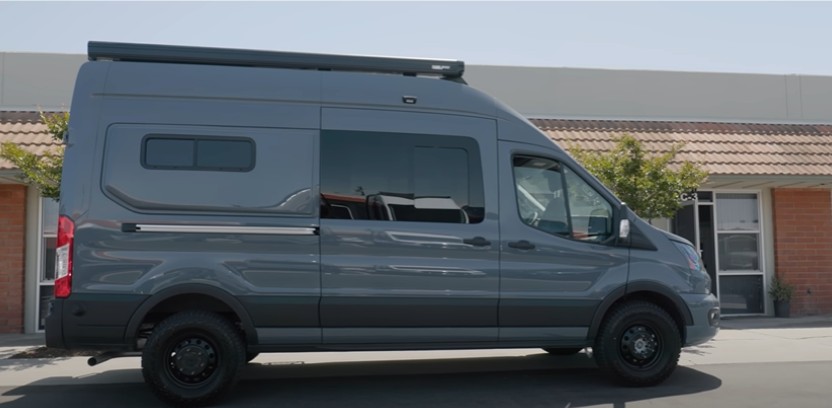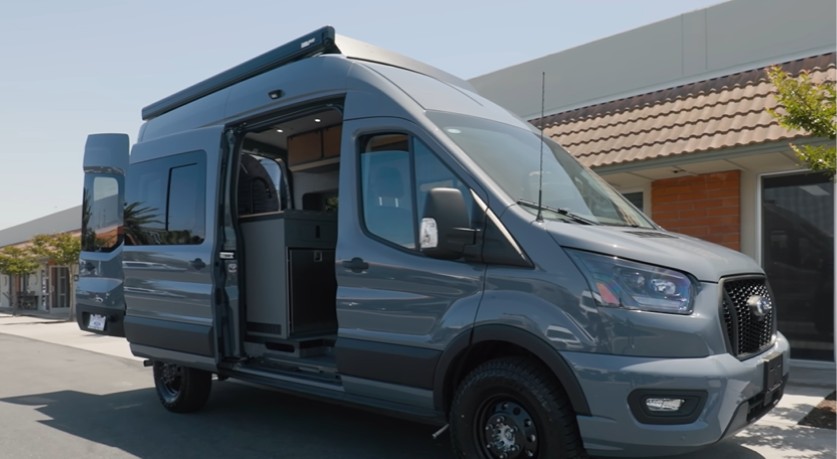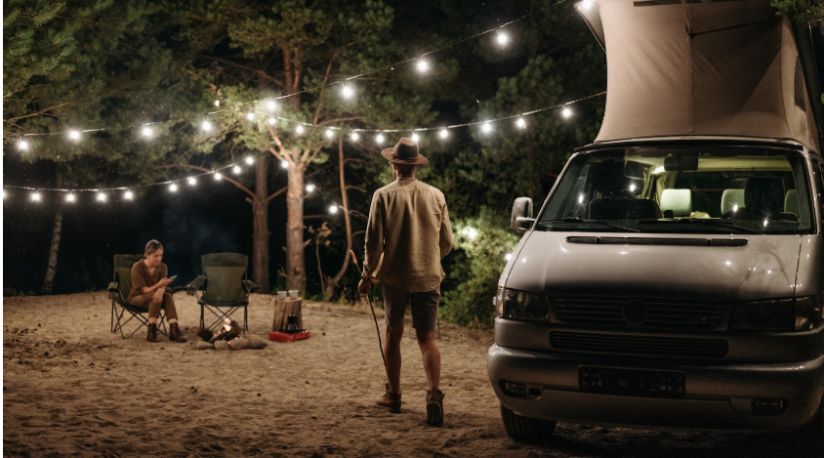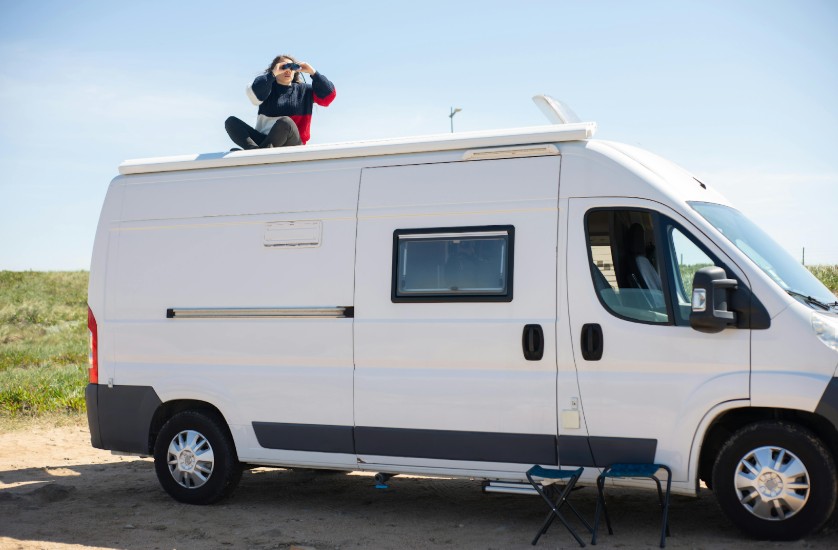Are you dreaming of hitting the open road with your very own camper van? The Ford Transit camper conversion is one of the most popular options for those looking to live the van life.
Whether you’re embarking on short weekend getaways or planning long-term travel, the Ford Transit camper van offers the perfect blend of space, functionality, and affordability.
In this comprehensive guide, we’ll take you through the entire process of converting a Ford Transit into a camper, from selecting the right model to designing the perfect interior. We’ll also dive into some essential considerations like cost, floor plans, and comparisons to other popular vans like the Mercedes Sprinter. Let’s get started!
Why Choose a Ford Transit Camper Conversion?

When it comes to converting a van into a camper, the Ford Transit is a top contender for many van lifers. Here’s why:
-
Affordable Pricing: Compared to other vans like the Mercedes Sprinter, the Ford Transit van camper is often more affordable, making it a popular choice for those on a budget.
-
Customizable Design: The Ford Transit camper van offers a high ceiling and ample interior space, making it easier to create a layout that fits your specific needs. You can include a kitchen, a bed, storage, and even a bathroom if space permits.
-
Fuel Efficiency: The Ford Transit RV is known for its fuel-efficient performance, especially compared to larger RVs. This makes it a great option for long-term travel, as it helps save on gas expenses.
-
Durability: Built to handle tough work environments, the Ford Transit is designed to be reliable and long-lasting, ensuring that your conversion will last for years.
Understanding the Different Ford Transit Models
When considering a Ford Transit campervan, it’s essential to understand the different models available. The Ford Transit Custom and Ford Transit Connect are popular options, each offering unique features that suit various needs.
-
Ford Transit Connect Camper Conversion: This smaller version of the Ford Transit is great for those who want a compact camper that’s easy to park and maneuver, especially in urban areas.
-
Ford Transit Custom Camper: Offering more space, this model is ideal for travelers who need more interior room for custom features like a full kitchen, bathroom, and plenty of storage.
-
Ford Transit 350: This version of the Ford Transit camper provides ample space for a larger conversion project. If you’re looking to build a fully equipped Ford RV van, the 350 offers the capacity for a more expansive interior.
Step-by-Step Guide to Converting Your Ford Transit

Converting your Ford Transit camper van can be an exciting yet challenging project. Here’s a simple guide to get you started:
Step 1: Choosing the Right Ford Transit Model
Select the Ford Transit model that fits your needs in terms of size, budget, and desired features. For example, if you’re looking for a larger living area with more amenities, the Ford Transit 350 might be your best bet.
However, for those who prioritize fuel efficiency and easy maneuverability, the Ford Transit Connect might be a better choice.
Step 2: Design Your Layout
The next step is designing the interior of your van. Here are some important considerations for your Ford Transit camper interior:
-
Sleeping Area: Many van lifers opt for a full-sized bed or a foldable setup that can transform the space into a multifunctional area.
-
Kitchen: A compact kitchen with a stove, sink, and fridge can be included. You may also want to add storage for cooking supplies and food.
-
Storage: Make sure to maximize storage space, especially if you’re planning on living in the van full-time. Cabinets, under-bed storage, and overhead compartments are great options.
-
Bathroom: Some choose to include a portable toilet or even a small shower if space allows.
Step 3: Insulate the Van
Insulation is key to making your Ford Transit camper van comfortable in various climates. Choose high-quality materials like spray foam, foam board, or Thinsulate to insulate the walls, roof, and floor. This will help regulate temperature and reduce noise from the road.
Step 4: Install Electrical and Plumbing Systems
If you’re adding a fridge, lights, or even a small heater, you’ll need to install an electrical system. A basic setup might include a solar panel, battery bank, inverter, and wiring for lights and outlets. If your design includes a water system, you’ll also need to install a water pump, tank, and plumbing for the sink and shower.
Step 5: Finishing Touches
Once the essential systems are in place, it’s time to finish your Ford Transit RV conversion with flooring, curtains, and any final touches that will make the van feel like home. A comfortable Ford camper van interior should reflect your personal style, so add cushions, blankets, and other accessories to create a cozy and inviting space.
Ford Transit vs Sprinter: Which is Better for a Camper Conversion?

A common debate among van lifers is whether to choose a Ford Transit camper van or a Mercedes Sprinter van camper. While both are excellent options for conversion, there are key differences:
-
Price: The Ford Transit is generally more affordable than the Sprinter, both in terms of initial cost and efforts of maintenance.
-
Space: The Mercedes Sprinter tends to offer slightly more space, especially with its high roof option. However, the Ford Transit van camper still provides ample room for most conversions.
-
Fuel Efficiency: The Ford Transit camper is known for being more fuel-efficient than the Sprinter, making it a better choice for those planning long trips.
Ultimately, it comes down to personal preferences and budget. The Ford Transit camper van offers great value and is well-suited for various types of conversions, while the Sprinter might be the better choice if you prioritize additional space and luxury features.
Ford Transit Camper Conversion Costs
The cost of converting a Ford Transit camper varies based on customization and materials.
A basic conversion typically ranges from $10,000 to $25,000. More elaborate conversions, with features like solar panels, custom cabinetry, and a full kitchen, can exceed $50,000.
When planning your Ford Transit build, consider factors like labor, materials, and specialized systems (e.g., electrical or plumbing). Creating a budget that suits your needs is always a good idea.
Ford Transit Camper Van for Sale: Where to Buy

If you’re ready to take the plunge and purchase a Ford Transit campervan, there are several options available:
-
Ford Dealerships: Many Ford dealerships offer the Ford Transit van camper with various configurations, including options for a van conversion.
-
Online Marketplaces: Websites like eBay, Craigslist, and specialized RV sites list used Ford Transit campers for sale, which can be a more affordable option.
-
Custom Conversions: Some van conversion companies, such as Wayfarer Vans and Paradigm Van Conversions, offer fully converted Ford Transit camper vans for sale.
Before purchasing a Ford Transit campervan for sale, make sure to inspect the vehicle’s condition, check for any previous modifications, and consider the cost of any additional conversion work that may be needed.
Frequently Asked questions
1. What is a conversion van?
A conversion van is a vehicle that has been modified to include living amenities like a bed, kitchen, storage, and more. These vans are ideal for long-term travel, camping, or as a full-time living solution.
2. What is van life?
Van life refers to a lifestyle where individuals live or travel in a van or RV, enjoying the freedom and mobility it offers. It’s a popular trend for people seeking adventure, simplicity, and a minimalist way of life.
3. Ford Transit vs Mercedes Sprinter?
The Ford Transit camper van is more affordable, with better fuel efficiency, while the Mercedes Sprinter offers more space and luxury. Both options are excellent for conversions, with the Transit being the better value for budget-conscious travelers.
4. Ford Transit van interior?
The Ford Transit van interior is spacious, allowing for plenty of customization options. With a high ceiling and wide body, it’s perfect for conversions. Many owners choose to add insulation, cabinetry, and comfortable furnishings to make the space livable.
5. Ford Transit build and price?
The Ford Transit camper conversion can cost between $10,000 and $50,000, depending on the level of customization. Basic conversions are affordable, while more luxurious builds can become expensive.
Why the Ford Transit Camper Conversion is Your Best Choice
The Ford Transit camper conversion offers an incredible opportunity for those seeking adventure and freedom on the open road. With its spacious interior, affordability, and fuel efficiency, the Ford Transit van camper is an excellent choice for van life enthusiasts.
Whether you’re building your own conversion or purchasing a pre-converted van, the Ford Transit camper van provides the perfect foundation for creating your dream camper.
With careful planning and the right materials, your Ford Transit campervan can be transformed into the perfect home on wheels.

